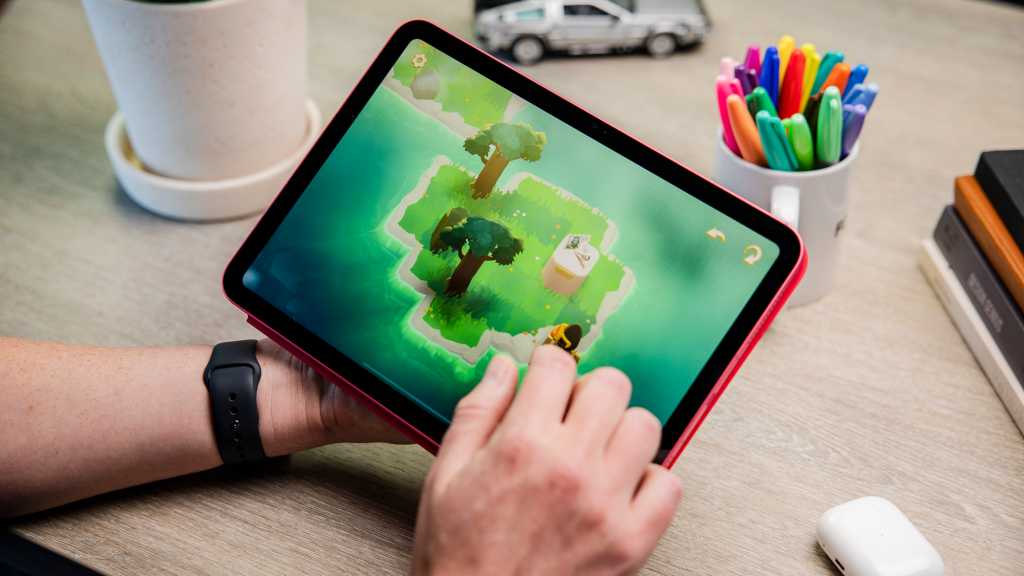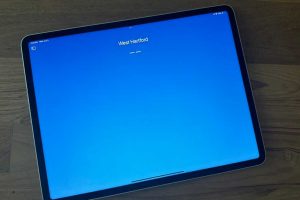
Given the choice, Tim Cook would obviously prefer customers to spring for the most expensive versions of Apple’s products. The Ultra version of the Apple Watch, the Max version of the AirPods, the non-mini HomePod, and the Pro versions of everything else. The problem is that customers generally feel the opposite—and nowhere is this truer than in the tablet market.
Surely some creative professionals use an iPad Pro for their work. The iPad Air has its fans too, and even the iPad mini is likely to shift some units after its (disappointingly minor) update last week. However, the vast majority of iPad users go for the standard model. Because of the low price, and because the way they use their tablet doesn’t require a super-fast processor or a high-end screen. For most people, the decision is a no-brainer.
Given the disproportionate popularity of the vanilla iPad, it feels odd that Apple has this year unveiled updated versions of every model except that one. In the spring we got a new Pro and Air; in the fall a new mini; but there’s no sign of the 11th-gen iPad and it’s starting to look like we won’t get one before the end of 2024. (In his weekly Power On newsletter, Mark Gurman reported that the entry-level iPad will “probably get updated later” in 2025.) But that’s the iPad people want! It would be like Marvel announcing that it isn’t going to make any more Spider-Man movies so it can focus properly on Howard the Duck.
I suppose from a strategic point of view, based on the upsell mentality I outlined in the first paragraph, it makes a certain amount of sense. By dropping the price of the 10th-gen iPad Apple keeps the loyalty of customers who prioritize value above all else, but by refusing to bump its specs the company can nudge everyone else towards the iPad Air.
But it still feels dangerous for Apple to ignore its most popular and important iPad because, like a pub owner getting rid of the dartboard, this risks alienating the core of the user base. Owners of the standard iPad may not update their machines very often, because having the latest specs isn’t necessary for checking your emails on the sofa. But when they do decide that it’s time to look for a new model, how are they going to feel about the state of the range right now? Offered the choice of spending far more than they planned to, or getting an iPad that was last updated in 2022 and is likely to be replaced in the near future, some will decide not to bother, and others will start to ask their grandchildren if Samsung makes iPads. Neither is a good outcome for one of Apple Park’s most beleaguered departments.
And that’s before we get to Apple Intelligence. It’s debatable how useful this will prove to be particularly in the short-term learning phase (a stage of product development that users of Apple Maps in 2012 will remember with little fondness). But it’s getting a lot of media attention, which means customer interest. And again, we have to ask which is more likely: A customer finds out the standard iPad doesn’t support Apple Intelligence, and happily spends an extra $250 on an iPad Air? Or a customer finds out the standard iPad doesn’t support Apple Intelligence, and walks sighing out of the store? It could lead to upsell, but it could also lead to no-sale… not to mention causing Apple to miss out on precious training data from a huge chunk of iPad users.
A risky business, then. Although it may be a risk Apple feels it’s worth taking, because the iPad range at the moment simply isn’t earning its keep. (iPad revenue went up for a quarter after the company finally released some new models earlier this year, but the signs are that it’s about to go down again.) Customers may want to buy a cheap iPad once every five years, but there’s no mileage, or at least very little revenue, in catering to that market. Apple may feel that it’s worth losing those customers if it means more sales of the higher-margin versions of the iPad. Because sometimes you need to get rid of the dartboard to bring in a higher-spending clientele.
Welcome to our weekly Apple Breakfast column, which includes all the Apple news you missed last week in a handy bite-sized roundup. We call it Apple Breakfast because we think it goes great with a Monday morning cup of coffee or tea, but it’s cool if you want to give it a read during lunch or dinner hours too.
Trending: Top stories
The worst things come to Apple fans who wait.
We’re about to find out if Apple’s big bet is going to pay off.
Sorry fellow kids, says the Macalope, Apple isn’t cool anymore.
Why the new iPad mini is a problem for Apple’s other products.
I switched to a cellular Apple Watch just to confirm I don’t need one.
How Apple can bring the Magic back to its Mac accessories.
Apple has finally announced a new iPad mini… but not much is new.
Podcast of the week
Apple released a new iPad mini this week! We talk about Apple’s new tablet and how Apple’s new approach to product releases may influence your decision to buy one or not.
You can catch every episode of the Macworld Podcast on Spotify, Soundcloud, the Podcasts app, or our own site.
Reviews corner
The rumor mill
Button-less case leak spills key details of next iPhone SE.
Apple’s Visions of the future: Four new products in the works.
iPhone 18 to get enhanced 2nm chip, 12GB of RAM.
Software updates, bugs, and problems
There’s a new XProtect security update–here’s how to make sure your Mac has it.
And with that, we’re done for this week’s Apple Breakfast. If you’d like to get regular roundups, sign up for our newsletters. You can also follow us on Facebook, Threads, or Twitter for discussion of breaking Apple news stories. See you next Monday, and stay Appley.




